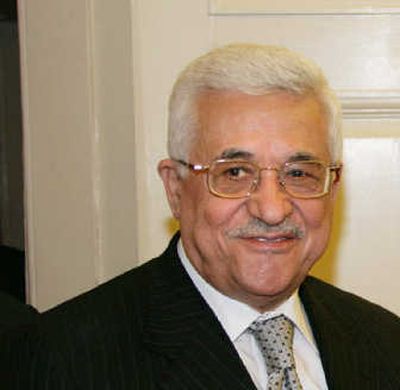Bush won’t stay for peace talks

WASHINGTON – President Bush, who has largely ignored the risky business of Middle East peacemaking throughout his nearly seven years in office, will take center stage today at the international peace conference he’s hosting in Annapolis, Md.
He won’t remain there for long, however. Bush plans to head back to the White House after delivering his opening speech to the diplomats and dignitaries at the U.S. Naval Academy, and while surprises are always possible, White House aides said he wasn’t planning to offer new proposals to resolve the conflict.
Nor is Bush expected to jump into extended post-Annapolis negotiations or head to the Middle East to pursue peace in the waning days of his tenure.
White House spokeswoman Dana Perino said the president’s speech would include “a little more detail.” But when she was asked to describe his message, she replied: “I would describe it as ‘encourage.’ “
Barring sustained presidential involvement, however, it remains doubtful that Israeli and Palestinian leaders – even with generous supplies of good will – can reach a deal over an independent Palestinian state.
That will require compromises on emotional issues such as the future of Jerusalem, the borders of a Palestinian state and the right of Palestinian refugees to return to homes in what’s now Israel.
“Almost everything they want to do requires a level of involvement that is just qualitatively different than anything we’ve seen before” from this president, said Dennis Ross, who had a leading role in Middle East negotiations under Presidents George H.W. Bush and Bill Clinton.
“This late in the day, administrations don’t tend to change their sociology,” said Ross, who’s now at the Washington Institute for Near East Policy, a research center.
Bush kicked off the diplomacy Monday, welcoming Israeli Prime Minister Ehud Olmert and Palestinian Authority President Mahmoud Abbas separately to the Oval Office.
On Monday evening, he was traveling to the State Department to attend a dinner for the nearly 50 foreign delegations attending the Annapolis meeting.
Bush told Olmert that he was “optimistic” about the conference. Olmert seemed more cautious, focusing on the fact that Arab countries that don’t recognize Israel have agreed to attend.
“We are going to have lots of participants in what I hope will launch a serious process of negotiations between us and the Palestinians,” he said.
Bush made it clear to Abbas that he anticipated a limited role for himself.
“The United States cannot impose our vision, but we can help facilitate,” he said.
Bush took office in 2001 harshly critical of Clinton’s eleventh-hour efforts to forge a peace deal at Camp David, which collapsed amid a new wave of Israel-Palestinian violence.
The Annapolis conference isn’t meant to reach agreements. Rather, it’s supposed to launch negotiations between Israel and the Palestinians, with the goal of reaching a historic deal within a year.
Negotiators from both sides, with an assist from Secretary of State Condoleezza Rice, were racing to complete a joint declaration to guide future negotiations.
Palestinians hoped the document would delve in detail into thorny issues such as borders and refugees.
But now it seems certain to be vague, reaffirming the sides’ commitment to an independent Palestinian state and to the 2003 “road map” for peace.